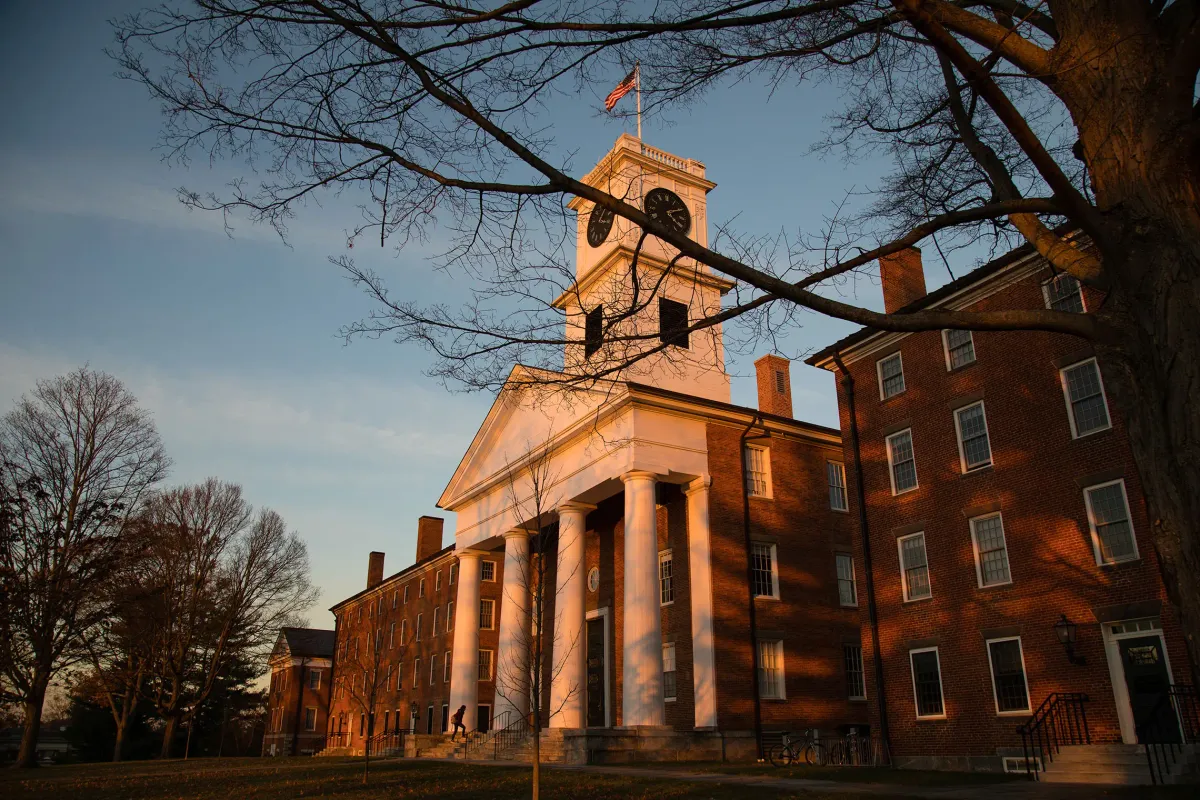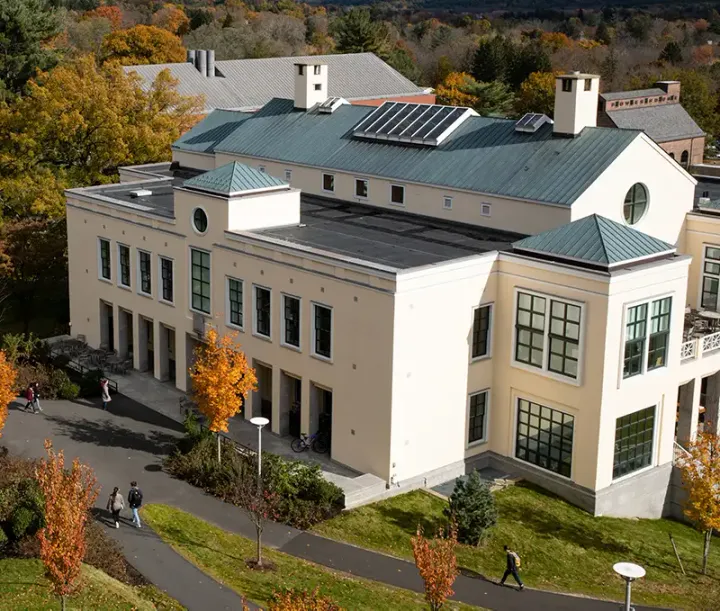College Concerned Over Potential Erasure of Education Department
Members of the Amherst administration expressed concern over the news of President Donald Trump’s potential elimination of the Education Department. Even if the department remains intact, widespread staffing cuts could be dangerous, college officials warned.

The interviews for this article were conducted prior to the March 11 announcement that the Department of Education will fire 1,300 of its 4,133 workers.
President Donald Trump is expected to sign an executive order dissolving the Education Department in the coming days.
In addition to nationwide ramifications, such action would impact the college’s financial aid, data collection and reporting, and accreditation processes, all of which engage with the department.
Jesse Barba, director of institutional research and registrar services, says his real fear is not that the department will close but that it will be so degraded that it cannot support institutions in meeting their obligations.
The Education Department's responsibilities include issuing Pell Grants and financial aid programs, delivering funds to local K-12 schools, enforcing civil rights on campuses, and collecting data on educational institutions. Under the potential executive order, some of the department’s programs would likely end completely, while others would be housed within different parts of the government. However, a complete dissolution of the department requires an act of Congress. Trump has said that he wants to bring education back to the states.
According to Lawrence Kluttz, associate chief communications officer, the college is “really concerned about the uncertainty of the [Education] Department right now, not just in the context of reports of its possible closure, but also staffing changes, new areas of policy focus because it puts all of the ways that we interact with the department in significant uncertainty.”
Kluttz said that one of the main roles of the Education Department is to ensure that there is stability and continuity in the ways that colleges and universities operate. “What we’re seeing right now at the federal level is putting that stability at significant risk,” he said.
The Education Department distributes billions of dollars in funds each year to schools, colleges, and universities. It also administers student aid, loans, and grants for students to afford higher education. If the department closes, it could impact how students receive federal aid.
Because Federal Pell Grants and campus-based funds are congressionally approved, Gail Holt, dean of financial aid, does not see them going away quickly. “At least not the Federal Pell Grant — that’s a key funding source for all students across this country to be able to attend and fund higher education. [To totally end them] seems like a drastic approach that, I will say I hope, is unlikely,” she said.
The college is fortunate, Holt added, that approximately 90% of the money that students receive towards their bill comes from an Amherst-funded source. Only 7% of the money, she said, comes from federally funded sources, which includes loans that students and their parents independently borrow. “It is a smaller piece of the pie, [but] it’s still a piece of the pie. We don’t take that lightly,” Holt said.
If federal grants and loans were to go away, “my hope is that Amherst, if absolutely necessary, would be able to cover that,” she added.
Holt believes that concerns over funding and the total closure of the department are premature. That being said, “I think there’s a lot that could impact us before that,” she noted. Holt is more concerned that instability in federal aid programs might complicate the admissions process.
The Education Department also manages the Free Application for Student Aid (FAFSA). Disruptions with staffing, as in the case of today’s announcement, or resources within the department, could make it harder for students to apply to Amherst.
“We’ve already had our hiccups,” Holt said, referring to the 2024-2025 FAFSA application which was supposed to open on Oct 1, 2023, opened on Jan. 1, 2024. “This year, they made some significant strides in improving that, but it still didn’t open up until Dec. 1,” Holt added.
Holt worries that students and their families will struggle to get answers to questions that they have about the process, given the staff cuts.
The college does not rely only on the FAFSA to determine its distribution of financial aid. It also asks students to complete the College Scholarship Service (CSS) Profile through the College Board. Holt said that even in the midst of the FAFSA delays, the financial aid department was able to stay on schedule because they could use the CSS Profile to offer financial aid to students.
Holt’s hope is that, even if Trump’s anticipated actions affect the FAFSA, the college can again rely more heavily on the CSS Profile. Beyond Amherst, though, only 271 institutions and programs use the CSS Profile. If FAFSA disappears, “it would severely curtail higher education as a whole. That’s why I think it’s less likely that that would happen, certainly not immediately,” she said.
Holt said staffing cuts at the department could also jeopardize important research functions for students. The department-run College Navigator and Institute for Post Secondary Education Data Statistics (IPEDS), for example, provide students with information about the aid that schools offer and how schools are spending federal dollars. “If that’s not maintained, or if they take that website down, you’re limiting access to information,” Holt said.
Similarly, Barba is concerned about what changes to the Education Department could mean for transparency in higher education.
The college is required by statute to report data to the Education Department through the National Center for Education Statistics. This includes data on human resources, the fall enrollment of the college, finances, graduation rates, admissions, etc. If the department were to close, Barba assumes that this data would need to be reported to another agency within the federal government.
“It gives me a little bit of anxiety, because we are required to do this in order to be eligible for federal funding, and if we can’t do it, what does that mean?” Barba said. “We’re not clear how we would meet that legal requirement,” he added.
The college already voluntarily publishes its “common data set” to the public. This data, Barba says, is targeted towards ranking agencies, such as US News. The common data set does not contain the level of detail that the federal government requires. Barba said that maybe colleges and universities would voluntarily publish the more detailed information if the federal government fails to. “But voluntary is very different than everyone doing it and having a very rigorous set of standards,” he said.
Currently, the college is at the end of its data collection process for the spring IPEDS data collection. Although the system is currently working, Barba worries about the possibility that the system will stop working close to the April deadline. “I’m encouraging everyone who has a role in that to submit as early as possible, because we don’t want to be non-compliant with our federal obligations,” he said.
Kluttz’s main concern at the moment is how to navigate uncertainty as things progress. “It’s definitely going to be a challenge,” he said.
Holt reaffirmed that the college is committed to supporting students through these challenges and periods of uncertainty. “What I can say is that Amherst will always do as much as we can to support our students. That’s the value of a small institution, and we will certainly speak up and try to advocate the best we can,” she said.
Correction, March 12, 2025: A previous version of this article misspelled Jesse Barba's name as "Jesse Barb."





Comments ()